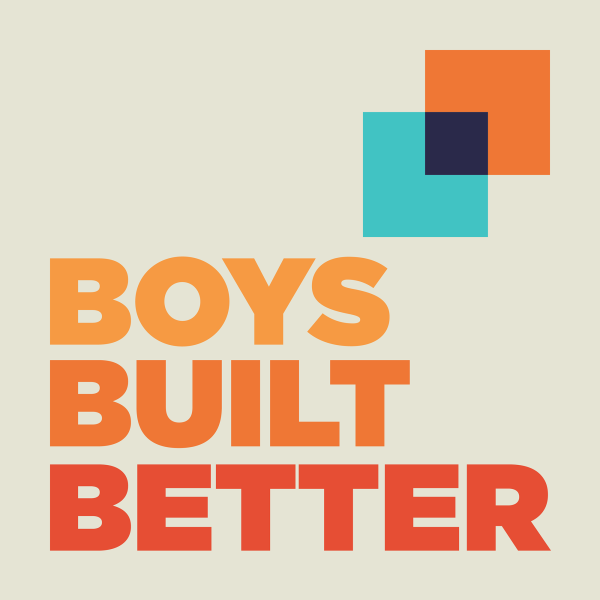
BBB 013: Connecting With Your Child and Supporting Emotional Development
Boys Built Better
Jan 1, 2019
•
Season 1, Episode 13
Show Notes
Happy New Year!!!
My resolution this year is to continue to be there for my boys in a greater way than just checking in on homework assignments daily. And today we are talking about just that.
I met my guest, Amber Olsen, through Facebook several months ago. Amber, is the founder of The Kaleidoscope Project, which is an organization helping to support the emotional development of girls. As I learned more about what she is doing, it became more and more apparent that the same issue is not only relevant but essential for boys and that Amber would make an awesome guest.
I feel like more and more I am reading about how critical it is to support your son’s emotional development to the same extent, if not more, than you would support a girl. The thing about boys is that they are constantly working against a societal expectation of being emotionless. But boys, especially pre-teens, aren’t emotionless and navigating the highs and lows of life is a complex emotional roller coaster and requires parental support.
But here’s the thing about supporting your child. There also has to been connection there. If you want to be able to talk feelings, you need to be present in your son’s life for more than just nagging about homework.
How can we, as parents, connect with our boys and use that connection to facilitate emotional development and health? Tune in to find out.
Resources
* Article on 12 Year Old Boys Emotional Development
* The Mask You Live In, film on emotional pressures of boys now playing on Netflix
* Article on Ramifications of Social Media on Emotions
* The Five Love Languages
Timestamps
* New Year’s Resolutions (1:15)
* Why Emotions (5:25)
* Middle Schoolers Unique Emotional Needs (8:29)
* How emotions are being affected today (13:14)
* Social Media Pressures (15:04)
* You Are What You Take In (18:22)
* How can Parents Support Emotional Health (20:00)
* Introvert vs. Extrovert (23:08)
* Do you want me to Listen or do you want Feedback? (24:08)
* Connecting with Your Child (25:05)
* Checking-in Emotionally (30:00)
* How involved should you get? (31:13)
* Ways we can make sure our child is being acknowledged and heard (39:18)
* Hug It Back (42:02)
* Strategies for dealing with emotions (44:58)
My resolution this year is to continue to be there for my boys in a greater way than just checking in on homework assignments daily. And today we are talking about just that.
I met my guest, Amber Olsen, through Facebook several months ago. Amber, is the founder of The Kaleidoscope Project, which is an organization helping to support the emotional development of girls. As I learned more about what she is doing, it became more and more apparent that the same issue is not only relevant but essential for boys and that Amber would make an awesome guest.
I feel like more and more I am reading about how critical it is to support your son’s emotional development to the same extent, if not more, than you would support a girl. The thing about boys is that they are constantly working against a societal expectation of being emotionless. But boys, especially pre-teens, aren’t emotionless and navigating the highs and lows of life is a complex emotional roller coaster and requires parental support.
But here’s the thing about supporting your child. There also has to been connection there. If you want to be able to talk feelings, you need to be present in your son’s life for more than just nagging about homework.
How can we, as parents, connect with our boys and use that connection to facilitate emotional development and health? Tune in to find out.
Resources
* Article on 12 Year Old Boys Emotional Development
* The Mask You Live In, film on emotional pressures of boys now playing on Netflix
* Article on Ramifications of Social Media on Emotions
* The Five Love Languages
Timestamps
* New Year’s Resolutions (1:15)
* Why Emotions (5:25)
* Middle Schoolers Unique Emotional Needs (8:29)
* How emotions are being affected today (13:14)
* Social Media Pressures (15:04)
* You Are What You Take In (18:22)
* How can Parents Support Emotional Health (20:00)
* Introvert vs. Extrovert (23:08)
* Do you want me to Listen or do you want Feedback? (24:08)
* Connecting with Your Child (25:05)
* Checking-in Emotionally (30:00)
* How involved should you get? (31:13)
* Ways we can make sure our child is being acknowledged and heard (39:18)
* Hug It Back (42:02)
* Strategies for dealing with emotions (44:58)
More Episodes
Episode
BBB 032: Family and Show Updates
Oct 9, 2019 • Season 2, Episode 4
Tune in for an update on where my family is now vs. when Boys Built Better started two years ago. T...
Episode
BBB 031: Vaping 101
Sep 25, 2019 • Season 2, Episode 3
Vaping has been all over the news lately, but if you are raising a young adult vaping has probably b...
Episode
BBB 030: Tough Conversations with Your Kids (Part 2)
Sep 11, 2019 • Season 2, Episode 2
Boys Built Better returns on NoCo FM with part two of our conversation recorded live at Heyday Fort ...
About Boys Built Better
Hi! I'm Jessica.
About The Host
Host, Boys Built Better
Jessica Crow created “Boys Built Better” as a resource for parents treading the waters of raising the next generation of smart, aware, and kind members of society. With a Master’s Degree in Early Childhood Education and year...
Jessica Crow created “Boys Built Better” as a resource for parents treading the waters of raising the next generation of smart, aware, and kind members of society. With a Master’s Degree in Early Childhood Education and year...




